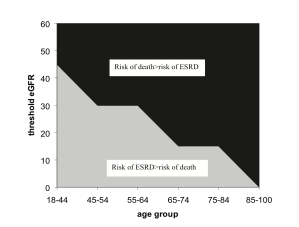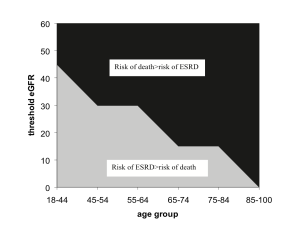Last week I saw several older patients who were fretting about their mildly reduced kidney function. All of them were women in remarkable health, but each one had at one time or another had a brush with hospital medicine:
Mrs. Allard had a mastectomy five years ago, Mrs. Perlman had an episode of clostridium difficile colitis last year after taking antibiotics for a dental infection, and Mrs. Jones had just finished rehab after a knee replacement. All three women had been labeled as suffering from chronic kidney disease during their hospitalization.
Mrs. Allard was in on Monday. She never fails to ask what her Glomerular Filtration Rate is when she comes in for her visits. Every time I have to reassure her that her numbers are stable. She struggles to believe me when I tell her that her frequent urination is not a warning sign of impending kidney failure.
“GFR is chemistry, bladder spasms are a plumbing problem”, I tell her every time. “They are not related.”
“I don’t want to end up on dialysis and I have read that people with kidney disease are more likely to have heart attacks. My nephrologist tells me that, too. Mrs. Perlman said last Tuesday. Between her quarterly visits with Harold Wesson, the Chief of nephrology at Cityside Hospital, she worries enough to always mention her kidneys when she sees me for other things.
“But, Doctor, I have Stage III kidney disease!” Mrs. Jones said with obvious fear in her voice. It was Thursday afternoon and we really should have been talking about the dark mole on her right thigh.
“That doesn’t mean you’re in any real danger…” I began. She looked suspicious. “In fact, your kidney function two years ago was exactly the same.”
“Are you telling me I had kidney disease already then?” Her eyes widened.
“To the same degree, yes. Do you remember how I asked you to stop taking ibuprofen for your sore knee because it could harm your kidneys?”
“Yes, that’s when you gave me those prescription pain pills.”
“Precisely. I was concerned then that we needed to be kind to your kidneys – that’s pretty much all we do when people have what we call Stage III chronic kidney disease.”
“But you never told me I have kidney disease.”
“I didn’t use the word because I feel it alarms people more than it helps them. We talked about what helps the kidneys and what hurts them; we got you off the ibuprofen, we tightened up your blood pressure control with a new medication and we lowered your cholesterol. All those things help your kidneys work better and last longer.
“But Stage III – I mean, how many stages are there? How close to dialysis am I with Stage III disease?”
I was ready for her question. With all the patients like her I have seen, especially lately, I have put together some articles and teaching materials.
“I have been a doctor since 1979 and I can count on one hand the patients I have cared for that ended up on dialysis or dying from kidney failure. Look at this graph”, I said and pointed to the latest addition to my bulletin board. “You’re 74, and your GFR is 54. This graph shows that at your age, your GFR would have to be somewhere around 15 to make you more likely to die from kidney failure than something else.
She stared at the graph.
“So 54 is actually not a bad GFR?”
“Well, it’s not normal in terms of perfection, but it is very common. Even people who aren’t perfect can live a long and happy life.”
“So you’re saying I shouldn’t worry?”
“Not about your GFR specifically. Remember to be kind to your kidneys, like we have talked about.”
She nodded.
“Now, here’s the bad news”, I explained. “People with even mild kidney disease statistically are more likely to have heart attacks, strokes and other cardiovascular problems.”
She started to raise her eyebrows, and I hurried to continue:
“But, and this is important: I’m not smart enough to know what’s the chicken and what’s the egg. Do they have kidney disease because they have hardening of the arteries everywhere, or does the kidney disease itself cause it to happen?”
I continued:
“So we do the usual things – good diet, cholesterol, blood pressure. And we don’t just focus on the GFR.”
“I can’t help worrying about the numbers”, Mrs. Jones said.
“There’s a name for that”, I told her. “We call it albuminurophobia.”
“Really?”
“Really. There is a medical term for just about everything these days.”
She shook her head.
“Now, about this mole”, I continued…




